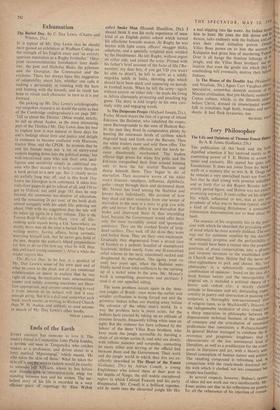Exhumation
The Burled Day. By C. Day Lewis. (Chatto and Windus, 25s.)
IT is typical of Mr. Day Lewis that he should have gained an exhibition at Wadham College on the strength of his English essay and 'an entirely spurious reputation as a Rugby footballer.' These joint recommendations foreshadow later duali- ties: the poet and Nicholas Blake, the pyloneer and the Georgian, the Communist and the cricketer. There has always been this suggestion of adaptability about him, whether one calls it seeking a personality or running with the hare and hunting with the hounds, and its result has been to vitiate each character in turn as it is put forward.
On picking up Mr. Day Lewis's autobiography our unspoken request is no doubt the same as that of the Cambridge undergraduate's on page 208: 'Tell us about the Thirties.' (Mine would, strictly, be tell us about Auden, as the most interesting part of the Thirties.) Mr. Day Lewis does his best to explain how it was natural in those days for one's feelings about love and justice and delight in existence to become confused with Marxism, tractor films, and the CPGB: he protests that he and his friends were not 'a lot of starry-eyed suckers leaping down into the political arena,' but well-intentioned men who saw their own intel- ligence and sensitivity simply as additional rea- sons why they should try to help society through a hard period to a new age. But it clearly seems an awfully long way off, and in this book Day Lewis the Georgian is in command. It takes him sixty-four pages to get to school at all, and 156 to get to Oxford; not until page 181 does he step beyond the enormous bat-shadow of education, and the remaining 26 per cent. of the book deals almost scrappily with his adult life, petering out about 1940 with no suggestion that the tale will be taken tip again in a later volume. This is the Forrest-Reid-Walter-de-la-Mare view of life: nothing quite equals being a kid. Somewhere, no doubt, there was all the time a buried Day Lewis writing poetry, having affairs, being sarcastic. worrying himself sick, but he never gets hold of the pen, despite the author's bland preparedness for him to do so ('let him say what he will, then, this awkward young customer'). After a while the reader regrets this.
The Buried Day, to be fair, is a product of Mr. Day Lewis's sense of his own past and of what he owes to the dead, not of any emotional exhibitionism or desire to explain that he was right all along. Its meditative tone. unsensational matter and mildly amusing anecdotes are there- fore appropriate, and anyone undertaking to read it from interest in its subject will find it easy enough going. But it is a dull and somewhat arch book, much nearer, as writing, to Richard Church than W. H. Auden. and unlikely to send anyone in search of Mr. Day Lewis's other books.
PHILIP LAKKIN






































 Previous page
Previous page